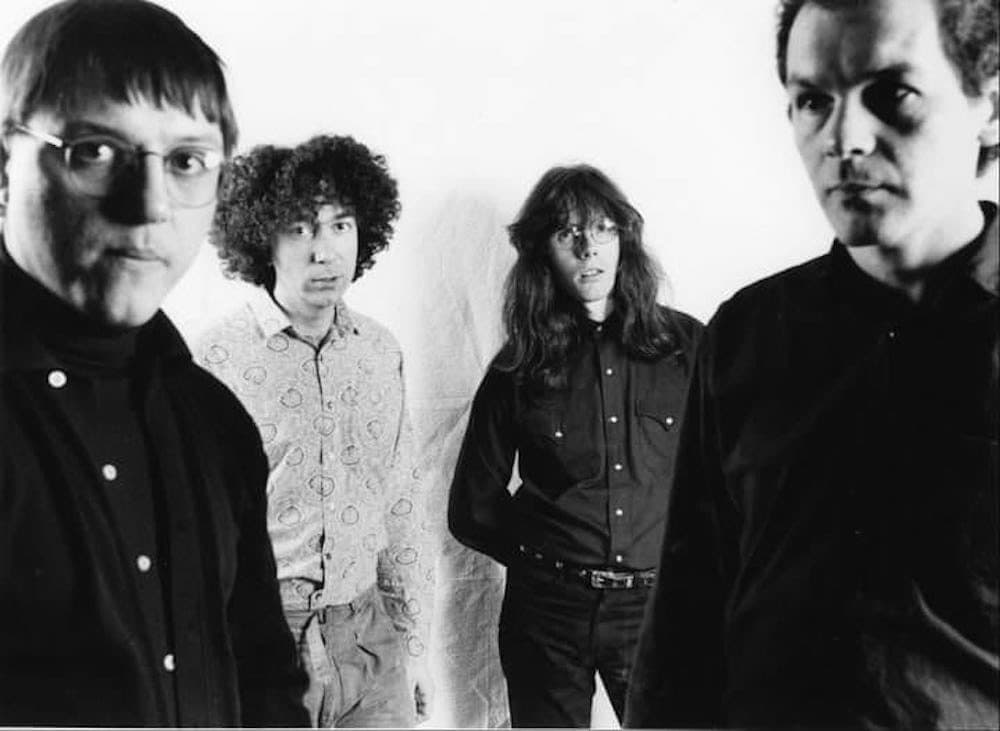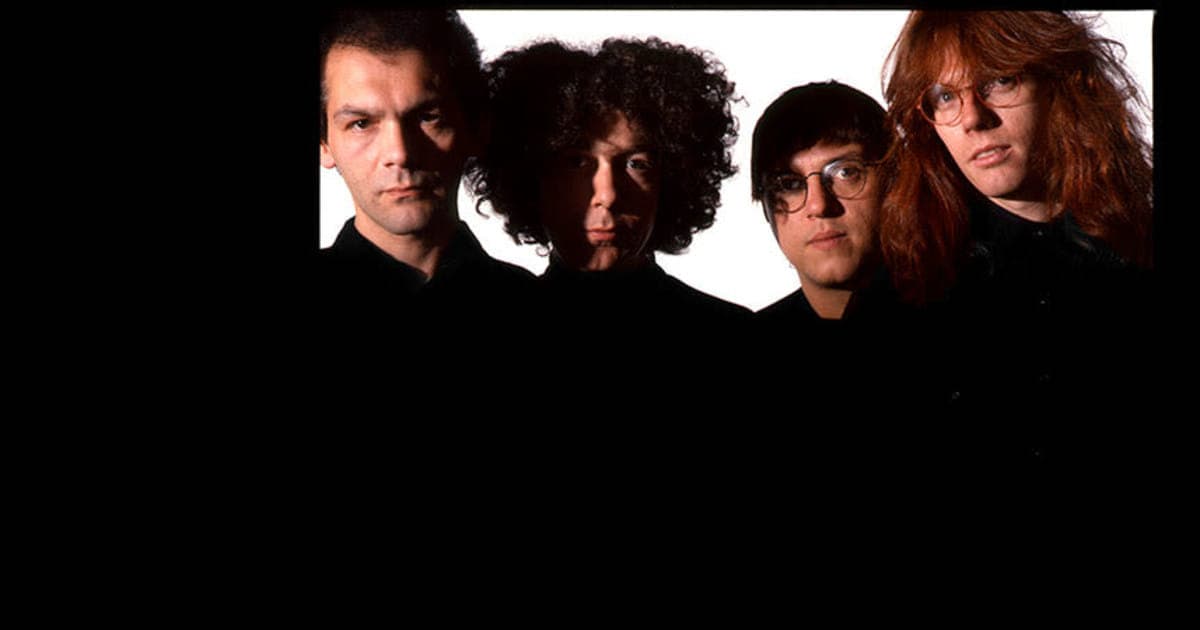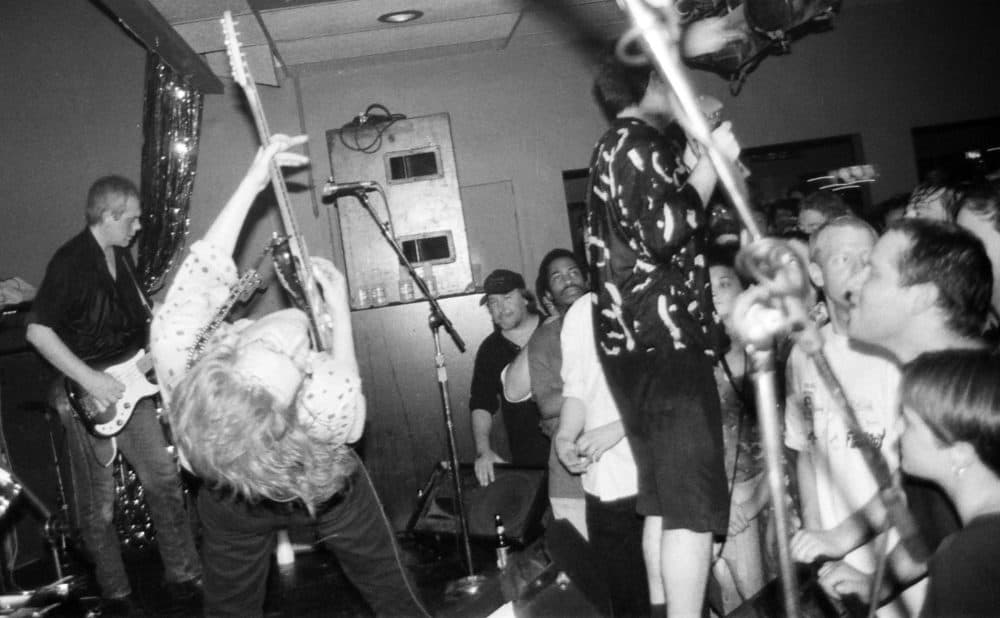Advertisement
The Zulus' Hard Rock Returns For Their First Gig In 24 Years

Larry Bangor, lead singer for the Zulus, likes to call his band’s reunion concert at the Paradise Rock Club Sept. 3 “the most postponed show in Boston music history!”
This is the fourth time the gig has been booked. A medical situation within the band knocked them out the first time in 2019 and COVID-19 restrictions did the trick the next two. But with the coronavirus back in our midst, the Delta variant getting stronger every day, who knows if the Zulus might be headed toward yet another postponement?
“I might be ridiculously naïve, but I don’t want it to be a super-spreader event,” says guitarist Rich Gilbert. “We have to make sure this virus gets totally squashed. We hope we can do this show in the manner we intended. Boston’s a good place to be right now. The infection rates are low, and even with cases spiking, it’s not as out of control.”
Adds Bangor: “Hopefully, new measures won’t be introduced, but if they have to be they have to be.”
As of now, the Zulus show is on and a full-house is expected for the Paradise’s first full-bore rock show since the March 2020 shutdown and the Zulus first gig in 24 years, when the band reunited at T.T. the Bear’s Place.
Now, if you weren’t a Boston rock fan in the ‘80s and ‘90s, you might be asking, who are the Zulus and why will they likely sell out a 933-capacity club?

The Zulus began life as a stripped-down, hard rock sequel to the eccentric and quirky late-‘70s new wave band Human Sexual Response. The Humans, with four singers and three instrumentalists, crafted songs that encompassed the dramatic, the haunting and the whimsical. In 1982, three of the Humans’ singers departed, leaving Bangor, Gilbert, drummer Malcom Travis and bassist Chris Maclachlan (who later exited to practice law and was replaced by Rich Cortese).
“I loved the Humans, but we didn’t fit in,” Gilbert says. Indeed, many thought with better marketing or distribution the Humans could have scored, à la The B-52s
With the Zulus more traditional rock lineup, the sound shifted and Bangor says, with a laugh that comes easier with distance, “We definitely lost a lot of fans, really fast.”
Like many of his generation, Gilbert came of age as a hard rock kid — grooving to Cream, Rolling Stones, Led Zeppelin, etc. — but when punk rock came crashing through the gates around 1976, he threw most of that aside. And then, when he joined a band, it was the crazy-quilt Humans.

After the Humans split, Gilbert says, “We didn’t have a concept of what the band was going to sound like but we were forced to go down a new road. Larry is a really strong dynamic lead singer and my guitar got way more upfront and aggressive. I don’t know why but the rock that I grew up listening to in high school — what I’d been turning my back on — I needed to re-evaluate it.”
“I don’t think we made a conscious decision to do hard rock, but I hear it,” Bangor says.
Still, Gilbert says, “there was something weirdly quirky and idiosyncratic about us,” even if the Zulus had shifted genres. Bangor’s vocal delivery — often sounding panicked or histrionic — guaranteed that. They were not as out there as the Humans. In many ways, they had to build back up again from the small club level, keeping some of the old faithful but trying to bring in new fans, too.
A sharp description comes from journalist Parry Gettelman writing in the Orlando Sentinel in 1990 that the band’s essence was “scrawling accessible rock hooks on a threatening wall of sound” and praising “both the Zulus’ heat-seeking guitar-vocal attack and its pulverizing rhythms.”
“We modulated our performances between rather slow numbers like ‘Totem Pole’ or ‘I.O.U.,’ while at the same time building to a frenzy by the end of a set,” Bangor says.
There was one six-song EP called “The Zulus” and one Bob Mould-produced album, “Down on the Floor,” which the band was unhappy with. In 1992, Gilbert decided to leave the group and, after a tour, they broke up. (The Zulus currently have a three-CD set, “Cockfight in a Bullring,” comprised of two Boston studio sessions and a live set at the Rat.)
“I was playing with a rewarding band, creatively,” Gilbert says. “It was easy to work together and felt like we got better and better. It never felt like we plateaued. Were we commercially successful? No. We weren’t able to crack the market outside the Northeast.”
But in the Northeast, at least, it worked.
One reason for the Zulus sonic success — and one not really considered by either Bangor or Gilbert until recently — comes from Eileen Rose. She was a self-described Zulus “fan girl” in the ‘80s and a singer-songwriter-multi-instrumentalist. Rose records under her own name and fronts a touring band called Eileen Rose & The Holy Wreck. Somewhere during the first decade of the 21st century, she and Gilbert fell in love. Then living in Nashville, they married in 2015 and played out together as an old-timey country duo, the Silver Threads. They now live in Maine.
Rose describes her early love of the Zulus: “Anyone who has been to a Zulus show knows what a powerful, heavy and exciting band they are. But their musical aggression never came across, to me, as singularly male, super alpha, or macho, like so many other hard-hitting rock bands. The lyrics were deeper, smart and so visual, without painting the picture from a specifically male perspective.”
Rose believed she could see herself in those songs and not feel excluded. “Everyone was welcome at Zulus shows. Male, female, gay, straight, trans, young, old — the more outsiders the better. And any rock fan could relate and hear themselves represented in the music. I didn't have to worry about being a girl in a pack of sweaty dudes losing their minds.”
“Of course,” she adds, “just knowing that Larry was an out gay man fronting a hard rock band immediately opened the door to inclusivity.”
“That’s pretty great and kind of eye-opening,” Bangor says of Rose’s take. “I never thought of it that way. We were all men but it wasn’t the typical macho attitude. I liked the wildness of it without macho. I never thought much about being gay in terms of being in the band, but I was aware that it was fairly evident, and it's a point of honor to see how at least one person with acutely attuned musical and social antennae perceived us. To have someone you respect appreciate you more than you realized is an honor and a thrill.”
If the group failed commercially, Bangor looks back on the Zulus’ rock ‘n’ roll ride as a successful one. “I loved it,” he says. “We got along really well, traveled together well, and loved the music we were making.”
The Zulus’ show takes place prior to Live Nation’s Oct. 4 mandate that all artists and fans be vaccinated or show a negative COVID test result, but the band has decided, according to Gilbert, "everyone will be required to show proof of vaccine or a negative Covid test within 48 hours of the show."
“As far as vaccine passports, I’m fine with the idea of them,” he adds. “I think it will still only encourage some non-vaccinated people to get vaccinated. And the holdouts who don’t want to be socially considerate and take measures to curtail the spread of Covid cases, well, I don’t want to be around them. If they get left out of social events, it was a choice they consciously made.”
The Zulus play the Paradise Rock Club on Sept. 3.



